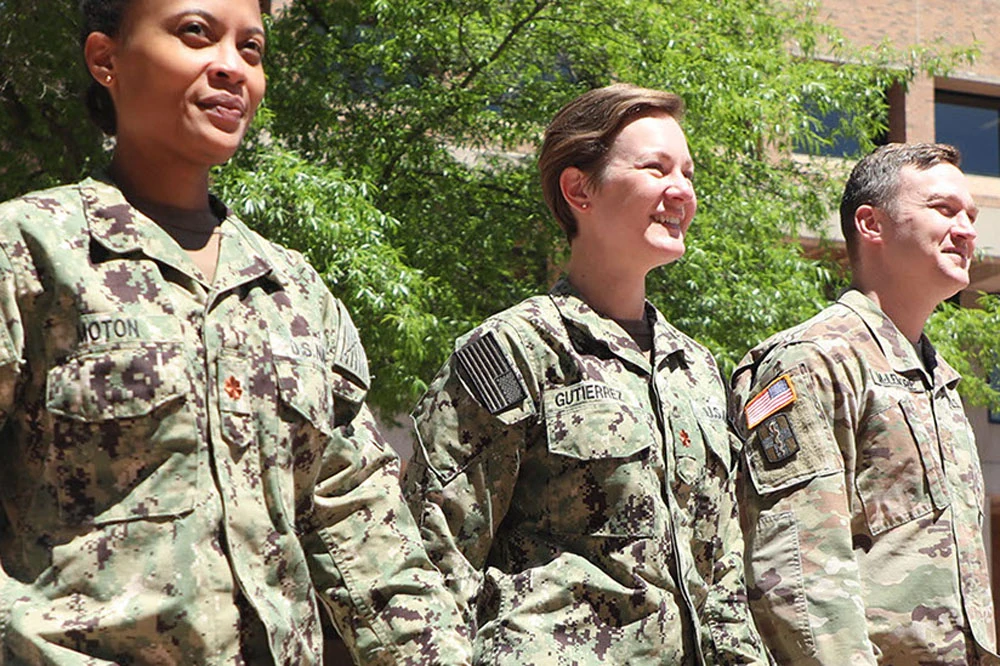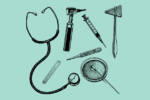
Imagine an adventure that combines passion, curiosity, steadfast dedication to helping others, and a clear focus on your goal of becoming a doctor – all without the burden of looming tuition costs. Such an adventure is more than possible; it’s an enticing reality with the United States military. Let’s explore this rewarding journey to becoming a physician, a voyage intertwining service, education, and boundless opportunities.
Dr. Robert Liotta and Dr. Laura Tilley from the Uniformed Services University of the Health Sciences (USUHS) offer a unique and unparalleled medical school experience. Learn how you can pursue your medical dreams without financial burden while serving your country.
- Experience a cutting-edge curriculum in a military-based environment.
- Attend medical school tuition-free, reducing financial stress.
- Enjoy unparalleled access to military research and networking opportunities.
- Foster a sense of camaraderie while serving your country and shaping your medical career.
Immerse Yourself in the Unique Sphere of Military Medicine
Being a military physician transcends simply wearing a uniform and serving your nation. It is an exceptional intersection of two deeply fulfilling fields: medicine and the military. This unique role offers the opportunity to make a profound difference, not merely to individual patients but on a broader scale, influencing communities and even the entire country.
Consider the experience of Dr. Laura Tilley, a military physician who expressed the deep honor of her service. In Afghanistan, a soldier on the verge of a mission once told her, “Doc, I know I can go on this mission because you’ve got my back if something happens to me.” This profound impact, marked by trust, is unique to the military medical field. It’s indeed a special feeling to ensure the safety and well-being of those actively safeguarding our nation.
Discover the essence of military medicine:
- Engage in a cutting-edge curriculum within a military-based environment.
- Witness the unique confluence of military and medical fields.
- Contribute to a cause larger than individual medicine, impacting communities and the nation.
- Experience the profound trust and camaraderie inherent in the military community.
By immersing yourself in this intersection of medicine and the military, you open up to unparalleled opportunities. Let this unique passion fuel your journey, with MedSchoolCoach illuminating your path.
Embrace the Opportunity: Graduate Debt-Free with a Medical Degree
A significant advantage of attending a military medical school such as the Uniformed Services University of the Health Sciences (USUHS) is the prospect of graduating free of the staggering debt that burdens many medical students. The military’s financial support offers the freedom to concentrate on learning and refining your skills without constant financial anxieties.
Dr. Robert Liotta, a USUHS faculty member, underscored the unique benefits of attending medical school through the military. The full tuition waiver, complemented by a monthly stipend, books, and health insurance, form immense incentives, making the dream of becoming a physician significantly more accessible. As Dr. Liotta put it, it’s not merely about graduating without debt; it’s also about being “paid as a second lieutenant while you’re in medical school.”
Imagine a future without the burden of debt, offering you a financially secure start to your career. This can be your reality by pursuing a military medical education.
Key takeaways from the debt-free education:
- Experience the freedom of a full tuition waiver, focusing solely on your education.
- Enjoy financial ease with a monthly stipend, health insurance, and books provided.
- Graduate debt-free, offering a financially secure foundation for your career.
- Experience the pride of serving your country while getting paid as a second lieutenant during your education.
The financial support of a military medical school can transform your dream of becoming a doctor into reality. Don’t let financial constraints steer your medical career.
Tap into Exclusive Military Research and Networking Opportunities
Beyond financial aid and comprehensive medical training, attending a military medical school opens doors to unparalleled research opportunities and an extensive network of professionals. These experiences shape your medical career and equip you for the diverse challenges in the medical field.
Dr. Liotta shares his journey, which wasn’t initially military-focused. However, after starting at a civilian institution, he sensed a void, prompting him to explore other avenues. That’s when he discovered the rich, meaningful opportunities the Uniformed Services University of the Health Sciences offered. The most profound part of his experience was the unparalleled access to military research and networking opportunities. His narrative paints a vivid picture of the potential that a military medical education holds for aspiring doctors.
Key insights from military’s unique research and networking opportunities:
- Collaborate with top researchers in the field, contributing to breakthroughs in healthcare.
- Network with professionals who provide valuable guidance and mentorship throughout your medical journey.
- Tailor your career path based on your interests and passions, leveraging these unique opportunities.
- Enhance your learning and understanding of diverse challenges in the medical field.
Take advantage of the unparalleled opportunities a military medical school offers.
Experience Camaraderie: Shape Your Medical Career While Serving Your Country
Becoming a doctor is often viewed as a solitary journey, filled with personal achievements and milestones. However, in a military medical school, you become part of a larger team that fosters a sense of camaraderie unparalleled in civilian institutions. You are not just a student; you are part of a larger mission serving your country while molding your medical career.
Dr. Tilley shares a glimpse into the unique camaraderie and purpose found in military medicine. She describes her experience serving in Afghanistan, where the bonds she forged and the mission-driven nature of her work provided a sense of fulfillment unique to military service. This level of trust and connection can be profoundly impactful, making it a core part of the military medical school experience.
Embrace these elements of camaraderie in military medicine:
- Serve a mission larger than yourself, providing medical aid to those serving the nation.
- Build lasting relationships with peers, faculty, and patients, fostering a supportive environment.
- Experience a deep sense of trust and reliance that enhances your work’s value and deepens professional relationships.
- Navigate the challenges of medical school as a team, forging bonds that last a lifetime.
Step into a journey where you belong, and make a lasting impact on others’ lives.
Answer the Call: Serve Your Country, Make an Impact That Matters
Serving in the military is not only about practical benefits; it’s about the deep sense of purpose that comes from contributing to a cause larger than yourself. As a military doctor, you play a crucial role in preserving the health and wellbeing of those who protect our nation. This sense of mission and purpose is deeply fulfilling and sets the military path apart from others.
Dr. Liotta encourages being open to adventure and uncertainty. He believes that if you’re thrilled by the adventure, the unknown opportunities, and are willing to do anything your country asks of you, a military medical career awaits. His philosophy underscores the mindset of viewing each opportunity as a blessing in disguise, making a military medical career both rewarding and fulfilling.
Stand up, serve, and make an impact that matters:
- Combine your love for medicine with your passion for serving your country.
- Make a tangible difference in the lives of service members and their families.
- Serve your country while pursuing a rewarding medical career.
Embrace the call of duty while forging a fulfilling and respected career in medicine.
Your Journey Begins: Acceptance into Medical School
To embark on this unique journey, you first need acceptance into medical school. It might seem a daunting step, but with the right guidance, it’s certainly achievable. MedSchoolCoach is your trusted partner, offering personalized guidance to enhance your application and boost your acceptance chances. With our assistance, you can:
- Benefit from personalized, one-on-one coaching.
- Craft a compelling personal statement.
- Prepare for interviews with experienced physicians.
- Strategize your application to suit your needs and goals.
- Navigate the MCAT with expert tutors and comprehensive study plans.
Embarking on this journey towards a tuition-free medical school education might be challenging, but with the right guidance, it’s more than feasible. Trust MedSchoolCoach to be your partner in this journey, offering experienced insight, compassionate guidance, and unwavering support every step of the way.
Medical education is a commitment to a lifelong mission of service, compassion, and continuous learning. The U.S military offers a unique pathway to fulfill this mission without the burden of tuition fees, enabling you to focus on your growth as a medical professional. This opportunity, coupled with camaraderie, networking opportunities, and the chance to serve your country, is unparalleled.
With your passion for medicine, dedication to service, and MedSchoolCoach expert guidance, you’re ready to take the first steps on your journey to a fulfilling career in medicine. Your adventure awaits! Let’s conquer it together.
Warriors (and Physicians) Wanted – Apply to the USUHS Today
The USU Admissions Committee works on a rolling admissions basis. This means that an applicant’s file is advanced onto the next phase as soon as the previous phase is completed. Failure to complete steps in a timely manner will delay the processing of an individual’s application. The process begins with an application to AMCAS. They advise applicants to apply in June, prior to the year of matriculation.
Learn more about the USUHS application process and be on your way!
Q&A on USUHS and HPSP
Eligibility and Application Process
Q1: Do you need to be a Veteran to take advantage of this opportunity?
A1: No, you don’t need to be a Veteran to take advantage of the HPSP or USUHS programs.
Q2: Can I apply to USUHS or HPSP if I’m not a U.S. citizen?
A2: For both USUHS and HPSP, you must be a U.S. citizen to apply. This is due to the requirement that students must be eligible for a commission in the U.S. armed forces.
Q3: Does living in Canada impact my chances for admission in USUHS?
A3: Being a U.S. citizen living- abroad, including Canada, does not impact your chances of admission to USUHS. However, you should be prepared to travel to the United States for potential interviews or other application processes.
Q4: Are there age restrictions on either program?
A4: Yes, both HPSP and USUHS have age restrictions, but waivers may be available on a case-by-case basis. The age limit for USUHS tends to align with the age limit for commissioning into the U.S. military, which varies by branch. However, waivers can sometimes be granted for exceptional applicants who exceed these age limits.
Q5: Do prior service have an age limit or total time in service hard cutoffs where we are not allowed to apply or be considered?
A5: Age limits and service time restrictions may apply, but waivers can sometimes be granted on a case-by-case basis.
International and Non-US Medical Schools
Q6: Does the military offer their aid/HPSP to students attending non-US medical schools?
A6: Typically, the HPSP is only available for students attending medical schools in the United States.
Q7: Are there any loan repayment options for students attending international medical schools?
A7: While there may be limited options available, students from international medical schools are generally not eligible for the same aid as those in domestic schools.
Service Commitment and Deployment
Q8: What specialties are needed and can you specialize in anything, even if it takes more than 4 years?
A8: The military generally has a need for various medical specialties. You can specialize in a field that takes longer than 4 years to complete, but this may affect the length of your service commitment.
Q9: How does the commitment increase beyond 7 years? Is it dependent on residency length?
A9: The length of your service commitment may depend on several factors, including the length of your residency and your specific program.
Q10: How many years do I have to serve after graduation?
A10: After graduation from USUHS, there is a seven-year service obligation. This is in addition to the time required for residency training, which also counts towards your service obligation.
Residency, Specialization, and Deployment
Q11: What specialties are needed and can you specialize in anything, even if it takes more than 4 years?
A11: The military generally has a need for various medical specialties. You can specialize in a field that takes longer than 4 years to complete, but this may affect the length of your service commitment.
Q12. Do USUHS students have the same access to residencies as civilian students?
A12: Yes, USUHS students have access to military residencies, and in some cases, they can apply for civilian residencies.
Q13: Do students complete the civilian match for residency as well?
A13: USUHS students typically participate in the military match. However, in some cases, students may also participate in the civilian match if they don’t match in their chosen specialty in the military match or if they are granted a deferment to do a civilian residency.
Q14: Can I choose my specialty in military medicine, or does the military choose it for me?
A14: As a student at USUHS or a participant in the HPSP, you can choose your specialty, but it is subject to the needs of the military. Therefore, while most students get their top choice of specialty, it’s not guaranteed.
Q15: Can a student do a civilian fellowship after residency?
A15: Yes, in some cases, students may be allowed to do a civilian fellowship after their residency. This is usually dependent on the needs of the military.
Logistics of Service
Q16: Can you volunteer to deploy if you wished to do so?
A16: While the specific procedures can vary, there are generally opportunities for military physicians to volunteer for deployment.
Q17: How many years do I have to serve after graduation?
A17: After graduation from USUHS, there is a seven-year service obligation. This is in addition to the time required for residency training, which also counts towards your service obligation.
Q18: Can I choose where to serve my obligation?
A18: In general, the needs of the military will dictate where you- serve your obligation. However, the military does take your preferences into account where possible.
Q19: Do I have to pay for my own uniform and equipment?
A19: No, as a member of the military, your uniform and most necessary equipment are provided for you.
Q20: Can you defer service commitment after USUHS?
A20: Typically, you cannot defer your service commitment after USUHS. However, exceptions may be made for unique circumstances, such as additional medical training or pursuing certain research opportunities.
USUHS versus HPSP
Q21: Are there any advantages of USUHS over HPSP?
A21: Some potential advantages of USUHS over HPSP could include a more in-depth focus on military medicine during- your training, being commissioned as an active-duty officer during school which counts towards retirement, and the opportunity to form close relationships with your military medical peers.
Q22: Can I join USUHS if I have already started medical school elsewhere?
A22: Yes, you can join the military later after going to a civilian medical school. This can be done through programs such as the Health Professions Scholarship Program (HPSP) or the Financial Assistance Program (FAP) for those in residency.
Impact on Family
Q23: What if I have a family? How does being in the military affect them?
A23: Being in the military can certainly impact your family. Frequent moves and deployments can be challenging. However, the military also offers strong support systems for families, including health care, housing, and community services. Each family’s experience will differ depending on their unique circumstances and the specific demands of your role within the military.
Q24: Can my spouse work while I’m active duty?
A24: Yes, your spouse can work while you are active duty. However, the frequent relocations common in military life may create some challenges in maintaining consistent employment.
Q25: What is the impact on children of being in a military family?
A25: The impact on children in military families can vary. There are certainly challenges, including frequent moves that can disrupt schooling and friendships. However, there are also unique experiences and benefits that come with being part of a military family, such as a strong sense of community and resilience.
Other Questions
Q26: What types of research opportunities are there?
A26: Research opportunities at USUHS span a wide range of topics, including military medicine-specific research, biomedical sciences, public health, and clinical research. There are ample research opportunities at USUHS, both during the school year and over the summer. The school emphasizes research as a key part of its curriculum.
Q27: Can I take a gap year during USUHS to pursue research or other interests?
A27: It’s generally not common to take a gap year during medical school, including at USUHS. However, you can discuss specific plans or ideas with school advisors or administration.
Q28: Can I join the USUHS if I have a criminal record?
A28: It depends on the nature of your criminal record. Having a criminal record can potentially disqualify you from military service, and therefore from attending USUHS. However, in some cases, waivers may be granted. It’s best to discuss your specific situation with a military recruiter.






